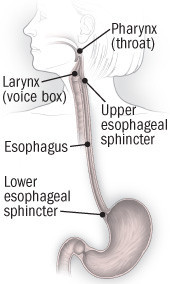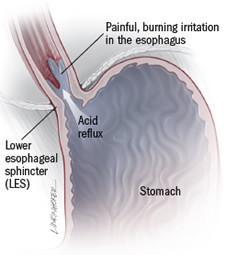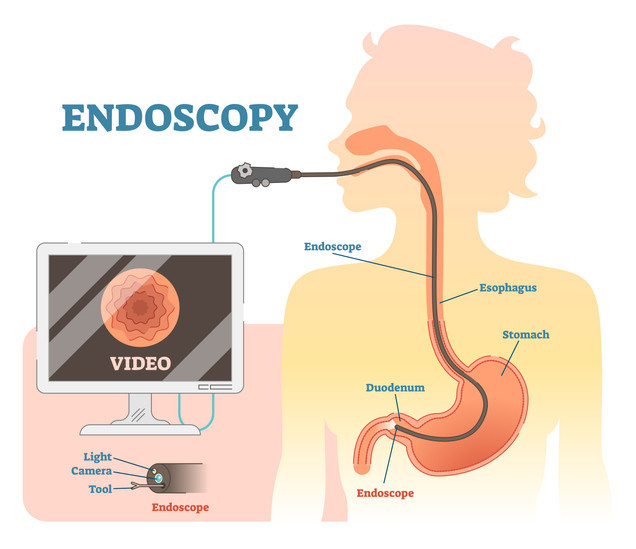Esophagitis
Medically reviewed by Drugs.com. Last updated on Oct 11, 2023.
What is Esophagitis?

The esophagus is the muscular tube that carries food through the chest, from the mouth to the stomach. Normally you don't feel it except when you are swallowing. However, if the inside lining of your esophagus becomes inflamed, you may experience pain or problems with swallowing. This inflammation of the esophagus is called esophagitis.

Esophagitis has several common causes:
- Acid reflux — By far the most common cause of esophagitis is acid reflux (also called gastroesophageal reflux disease or GERD). It is a backflow of digestive acid from the stomach, resulting in a chemical burn of the esophagus.

- Eating disorders — Similar to acid reflux, frequent vomiting can cause acid burn in the esophagus. Esophagitis sometimes is seen in people with eating disorders such as bulimia.
- Medications ("Pill esophagitis") — Some common medications also can cause a chemical burn in the esophagus. Pills that are most likely to cause esophagitis include
- aspirin
- doxycycline
- iron supplements
- nonsteroidal anti-inflammatory drugs (NSAIDs) such as ibuprofen (Advil, Motrin) or naproxen (Aleve, Naprosyn)
- osteoporosis medications such as alendronate (Fosamax) or risedronate (Actonel)
- Chemotherapy and radiation therapy for cancer — Some of these treatments can injure the esophagus lining, resulting in esophagitis.
- Infections — Infections in the esophagus also can cause esophagitis. They usually occur in people with a weak immune system. Esophagitis from infections is more likely to occur in people who have uncontrolled HIV infection, use steroid medicines long-term, have had organ transplants, or have been treated with chemotherapy for cancer. Only a few types of infection are common in the esophagus, such as
-
- yeast (candidiasis)
- herpes virus (HSV)
- cytomegalovirus (CMV).
Eosinophilic esophagitis is a special subtype of this condition. The diagnosis is based on biopsy samples of the esophagus that show a predominance of eosinophils. Eosinophils are a type of white blood cells that the body may produce in response to inflammation or an allergic reaction.
Symptoms
The main symptoms of esophagitis are:
- Pain in the chest (behind the breastbone) or throat. The pain can be burning, heavy, or sharp. If acid reflux is the cause of esophagitis, the pain may be worse after meals or when you lie flat. Pain from esophagitis may be constant or may come and go.
- Swallowing problems, including worsening of the chest pain when you swallow or a feeling of food sticking in your chest after you swallow.
- Bleeding, seen as blood in vomit or as darkening of the stools.
Diagnosis
The diagnosis often is made based on your symptoms.
The most accurate way to check for esophagitis is for a doctor to look directly at the inside of the esophagus with a video camera called an endoscope. The endoscope has a camera at the end of a flexible, plastic-coated cord. This tube is long enough to reach through the stomach to the first portion of the intestine (duodenum). The procedure is sometimes called esophagogastroduodenoscopy or EGD.
Using the endoscope, the doctor can see evidence of injury from esophagitis. The doctor will look for areas where the lining of the esophagus has worn away (called erosions or ulcers), blisters, or scarred areas. Some infections leave a deposit on the esophagus walls that can be sampled through the endoscope by using a remote-controlled brush. In some cases the doctor will biopsy the esophagus by snipping a small sample of the inside lining through the end of the endoscope. This tissue is examined under a microscope.
|
|
Since esophagitis is only one of the things that can cause symptoms of chest pain or swallowing problems, your doctor may order other tests to evaluate your heart, lungs, or digestive tract.
Expected duration
How long symptoms last depends on how easily their cause can be eliminated. Bad cases of reflux or resistant viruses, for example, might require several tries before the right medicine or treatment is found. In most cases, symptoms begin to improve within a few days of starting the right treatment. But it can take weeks for symptoms to go away completely. Esophagitis from an infection may be harder to cure if the immune system is severely weakened.
Prevention
The most common cause of esophagitis, acid reflux, sometimes can be prevented by some very simple measures:
- Avoid heavy meals, especially within several hours of bedtime.
- Cut out cigarettes and alcohol.
- Avoid large amounts of caffeine, chocolate, peppermint, and high-fat foods.
- Control your weight.
If you have heartburn despite these measures, your doctor may suggest you take a preventive acid-blocking medicine.
All prescription and nonprescription pills should be taken while you are upright and should be swallowed with water. This is especially important for the medicines that frequently cause esophagitis.
Treatment
Treatment depends on the cause of esophagitis.
- Acid reflux — Lifestyle changes help reduce reflux:
- Lose weight if necessary.
- Eat smaller meals.
- Don't lie down right after eating.
- Discover and avoid foods that cause symptoms.
Acid-blocking medications, including H2-blockers and proton-pump inhibitors, are usually prescribed. For persistent esophagitis, your doctor may recommend surgery to tighten the lower esophageal sphincter.
- Pill esophagitis — Drinking a full glass of water after taking a pill can help. Usually, if esophagitis has occurred, it is necessary for you to stop the medicine at least temporarily while you heal. Since acid can worsen esophagitis caused by medications, your doctor also may prescribe an acid-blocking medication to speed healing.
- Infections — The choice of treatment depends upon the infectious agent causing the esophagitis. Some esophagus infections are difficult to treat with swallowed pills or liquids, so medicines may be given intravenously (into a vein).
- Eosinophilic esophagitis — Because eosinophilic esophagitis can be triggered by acid reflux, treatment usually includes lifestyle changes and proton-pump inhibitors. When food allergies can be identified, eliminating those foods may be sufficient. Specific treatment can also include topical corticosteroids with fluticasone sprayed in the mouth and swallowed, or a slurry of oral budesonide.
While your esophagus is recovering, your doctor can ease your pain symptoms by prescribing pain relievers.
When to call a professional
If you are unable to eat or drink due to pain during swallowing, you should contact your doctor. Life-threatening dehydration can develop quickly if you cannot drink liquids.
Occasionally an injured esophagus can develop a hole, causing sudden worsening of chest pain, shortness of breath, or fever. Report these symptoms to your doctor immediately.
If your symptoms do not clear up with initial treatment, consult your doctor. Occasionally, scarring in the esophagus will cause persistent swallowing difficulty that might require dilation therapy done through the endoscope.
Prognosis
Almost all cases of esophagitis can be cured. Some causes, such as acid reflux, may require long-term treatment.
Additional info
American College of Gastroenterology
https://www.acg.gi.org/
American Gastroenterological Association
https://www.gastro.org/
Further information
Always consult your healthcare provider to ensure the information displayed on this page applies to your personal circumstances.

